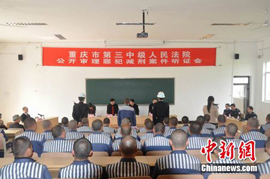In August, Chinese government sources updated Dui Hua on the status of eight people sentenced in Chongqing Municipality. Four prisoners sentenced for crimes of endangering state security (ESS) received sentence reductions.

Song Bukun (宋步坤), an activist from a rural area of Chongqing Municipality, was released 11 months early from Sanhe Prison on September 7, 2013. In the first official response Dui Hua received to inquiries dating back to 2005, government sources said Song received an 11-month sentence reduction in February 2009. He was a leading member of the “Southwest Yangtze Column of the Chinese Anti-Corruption Army” (中国人民农工反腐败大军西南长江纵队). Established among farmers in 1998, the group called itself a democratic alternative to the Communist Party of China (CPC). It opposed excessive agricultural taxes and, on the tenth anniversary of the 1989 pro-democracy movement, distributed fliers calling for the rehabilitation of June Forth.
Sentenced to 12 years’ imprisonment for subversion in the early 2000s, Song is believed to be the last member of the group to be released from prison. Previous government responses confirmed the releases of three other leading members following sentence reductions of 12‒15 months. Luo Haiyuan (罗海元) was released in June 2011, and Yang Jiahua (杨家华) and Xiang Xingheng (向兴恒) were released in the first half of 2013.
Former county-level official Rao Wenwei (饶文蔚) received a 20-month sentence reduction on September 14, 2011, and is scheduled for release on November 18, 2018. He was detained one month before the 2008 Beijing Olympics and sentenced to 12 years’ imprisonment for taking bribes and inciting subversion. Rao wrote a series of 53 essays that were published by The Epoch Times and other “anti-China” websites. He admitted to writing the articles but stated in his defense that his friends submitted them to the overseas websites without his consent. In the essays, known collectively as A Short Critique of the Communist Party—‘Reactionary’ Notes from a Chinese Man, Rao predicts the downfall of the CPC in the post-2020 period due to young leaders’ lack of enthusiasm for serving the people and their self-interested yet blind employment of slogans such as Jiang Zemin’s “Three Represents” and Hu Jintao’s “Scientific Development.” Rao also opines that Bo Xilai’s inauguration speech, marking the beginning of the “Strike Black” campaign in November 2007, demonstrated the authoritarianism, totalitarianism, and nepotism of the Communist-led system.
Veteran political activist Xu Wanping (许万平) received his second and third sentence reductions of 14 and 10 months in June 2012 and February 2013, respectively. He is now scheduled for release on April 29, 2014. According to overseas media, prison authorities have denied medical parole despite spleen problems and general ill health. In 2010, Radio Free Asia reported that Xu was on the verge of mental breakdown as a result of prolonged solitary confinement. The Chongqing No.1 Intermediate People’s Court convicted Xu of subversion and sentenced him to 12 years’ imprisonment on December 21, 2005. In its verdict, the court stated that Xu wrote articles, recruited members, and raised funds for the China Democracy Party and organized online campaigns calling for the praise of ESS prisoners and political activists. Xu was sentenced to three years of reeducation through labor in 1998 for joining the China Democracy Party and was imprisoned in 1990 for founding the China Action Party. Both groups were banned by the Chinese government for advocating the end of one-party rule.
Government sources confirmed that four members of the “Mao Zedong Thought Communist Party of China” (中国毛泽东主义共产党) are serving sentences for subversion in Chongqing and Guizhou Province. Incarcerated in Yunzhou Prison, Ma Houzhi (马厚芝) and Wei Jinxiang (蔚晋湘) are serving 10-year sentences that expire in October 2019. Held in Guizhou’s Zunyi Prison, Niu Yong (牛勇) and He Yuanfa (何远发) are scheduled for release from five- and six-year sentences in September of 2014 and 2015, respectively.
The Mao Zedong Thought Communist Party is one of several leftist opposition parties in China. Established in November 2008, the party claims to be the genuine vanguard of Marxism-Leninism-Mao Zedong Thought, an ideology it says the CPC abandoned in 1978 with Deng Xiaoping’s economic reform. According to online copies of its “Ten Declarations,” the party intended to stage a proletarian revolution; purge capitalism and corruption; and provide employment, housing, education, and healthcare for all. In October 2009, during Bo Xilai’s reign, more than 30 party members were detained by armed police and state security officers for attending a secret meeting in Wenshan County. They were charged with “illegal assembly,” “organizing terrorist activity,” and ESS.
Convicted of spying for Taiwan and illegally trafficking in state secrets, Xu Jianchi (许剑池) received sentence reductions totaling 20 months in April 2010 and February 2012. Xu is scheduled for release from Yuzhou Prison on February 14, 2014. He received a 15-year sentence for allegedly using Taiwanese organizations based in Hong Kong and the US Embassy in Bangkok to pass high-level Chinese intelligence to Taiwan and the United States.
